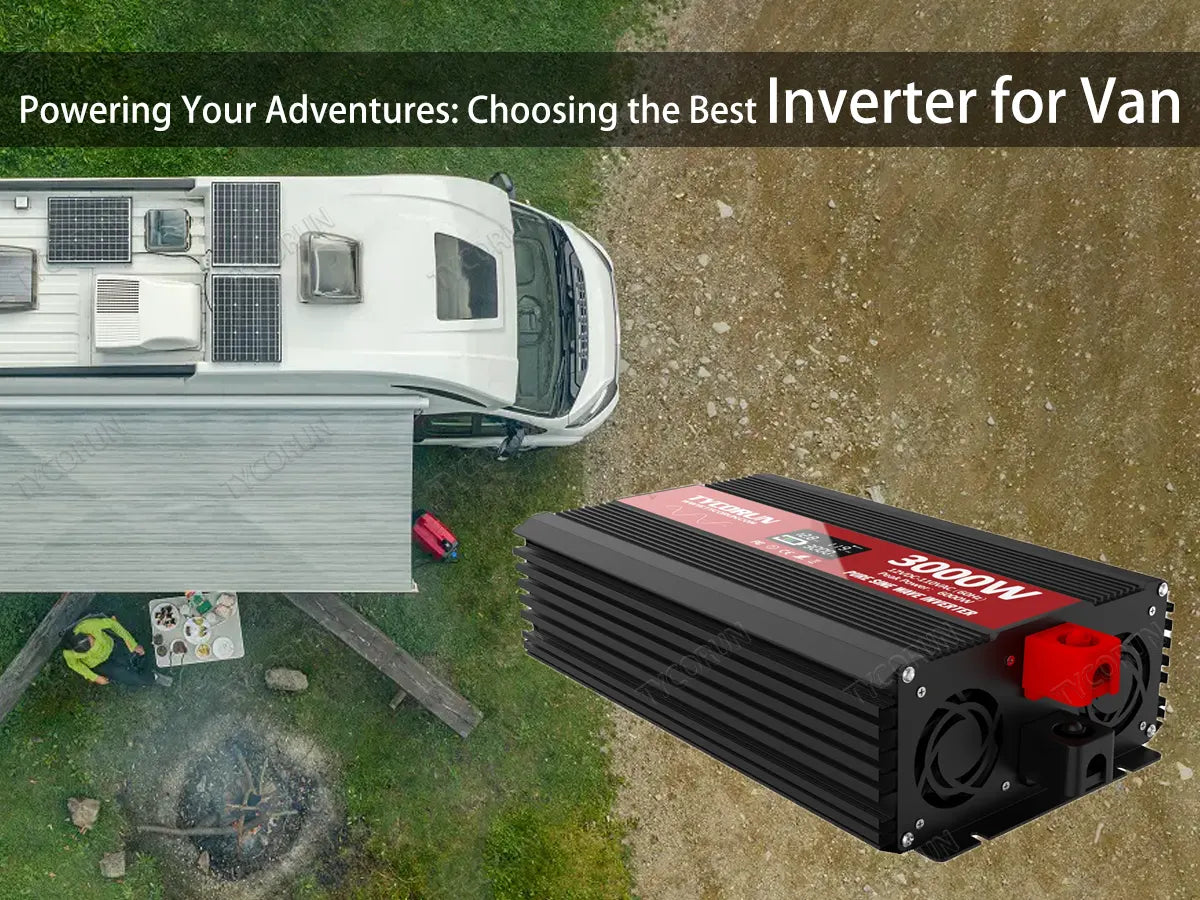
Nowadays, most young people will choose van for traveling and playing, and van is one of the applications of inverter. This article will talk about how to choose an inverter for van and TIPS on how to use inverter on van, I hope this article will be helpful for those who like campervan.
Main content:
- Why do I need an inverter in my van?
- Which is better - inverter for van or converter?
- What is the best inverter for a campervan?
- What size do I need for an inverter for van?
- The top must-have appliances for an inverter for van
- What size inverter do I need for my camper van?
- How to choose an inverter for van?
- Tips when using a power inverter for van
- How to install a power inverter for van
- FAQs
Why do I need an inverter in my van?
Embarking on van life or using a van for outdoor adventures often involves the need for a reliable power source.But batteries alone cannot supply all appliances, and this is where an inverter for van becomes an essential tool.
An inverter converts direct current (DC) power from the battery into alternating current (AC) power, allowing you to run a variety of electronic devices and appliances in your campervan. Whether it's charging your laptop, running a blender, or powering other essential electronics, an inverter adds a new dimension to the versatility of your van.
Which is better - inverter for van or converter?
The terms "inverter" and "converter" are often used interchangeably, but they serve different purposes. A converter typically changes 120-volt AC power to 12-volt DC power, there are two main types of half-wave rectifiers and full-wave rectifiers, and the inverter converts in the opposite direction, converting 12 volts DC to 120 volts AC.
There are two main types of modified sine wave inverter and pure sine wave inverter. Equipped with appliances designed for standard household outlets, an inverter for van is the better choice, offering the flexibility to power a broader range of devices.
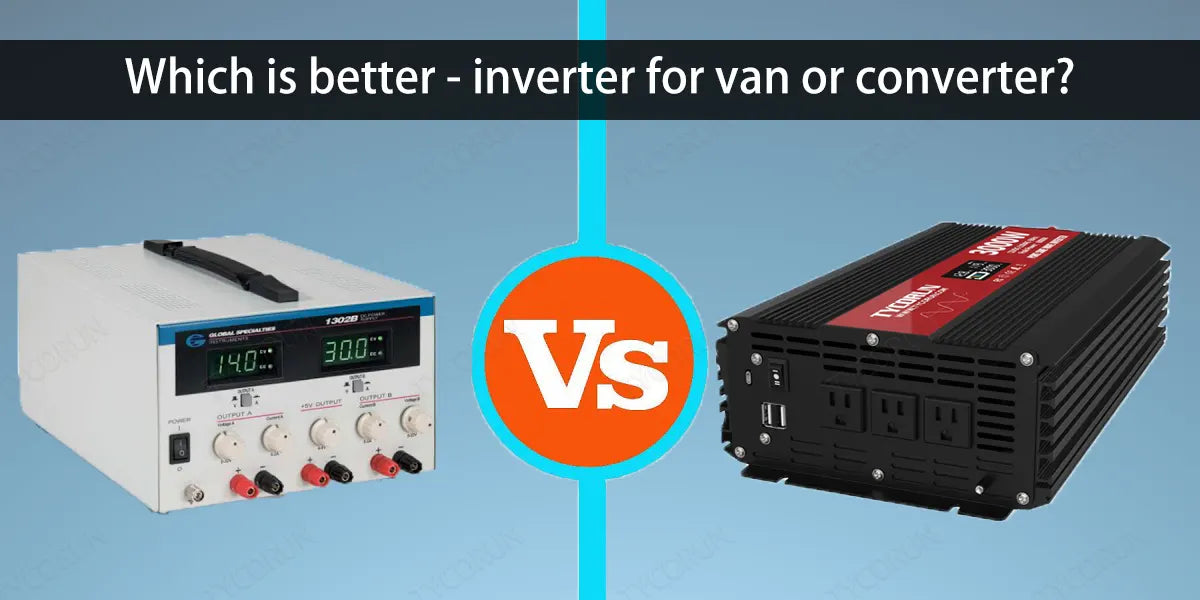
What is the best inverter for a campervan?
Choosing the best inverter for van involves considering your power needs and the devices you plan to use. One notable contender in the market is the pure sine wave inverter, known for its reliability and efficiency.
The pure sine wave inverter for van is designed specifically for recreational vehicles, including campervans, ensuring a stable power supply for your adventures, delivering clean and stable power to safeguard sensitive electronic devices.
With the pure sine wave inverter, you can confidently power your van, knowing that you have a reliable and efficient solution to meet your energy needs.
What size do I need for an inverter for van?
Simply go for the right size van inverter based on your power needs during the use of the van, taking care not to overload or underutilize the unit. The size of the inverter is determined by its capacity, measured in watts.
The top must-have appliances for an inverter for van
Before determining the size of the inverter for van you need, it's essential to identify the appliances you plan to power in your van. Common must-have appliances include a refrigerator, lighting, a laptop or other electronic devices, and possibly a small cooking appliance.
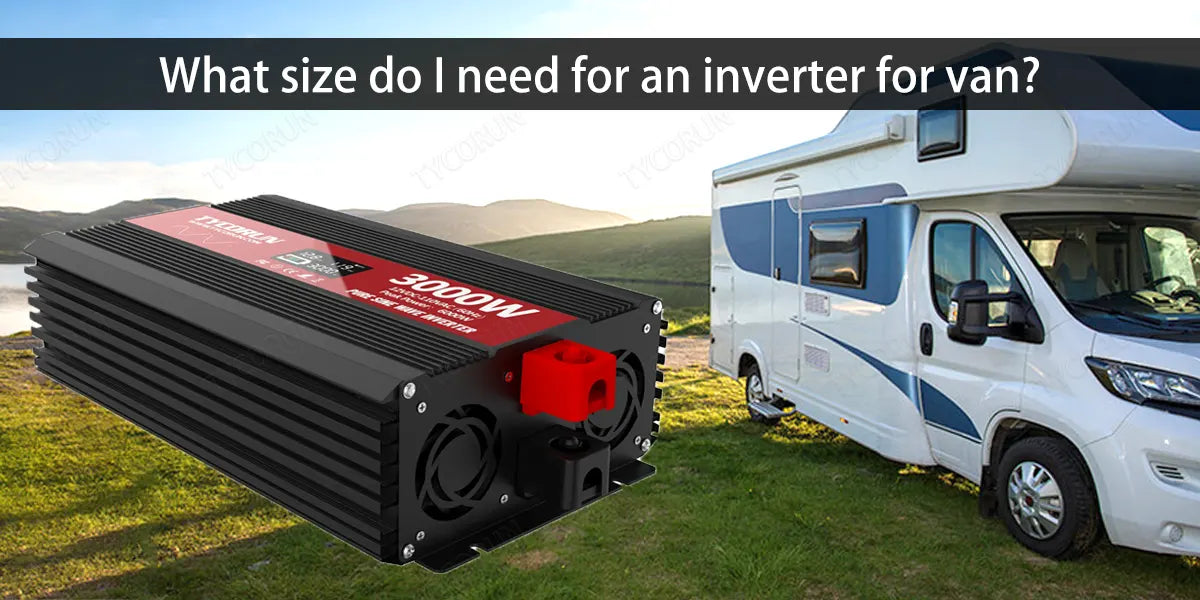
What size inverter do I need for my camper van?
- Voltage : Most vans operate on a 12-volt electrical system. Therefore, a 12-volt is the standard choice for an inverter for van applications. This ensures compatibility with the van's battery system and allows for efficient power conversion.
- Capacity: The capacity of the inverter is measured in watts and determines how much power it can deliver. Calculate the total wattage of the appliances you plan to use simultaneously to determine the minimum capacity you need.
For example, if you intend to run a 500-watt refrigerator and a 300-watt laptop, you'll need a capacity of at least 800 watts for your inverter for van. If you want to add other small devices, you can choose 1000w inverter.
How to choose an inverter for van?
Choosing the right inverter for van involves several considerations:
- Pure sine wave vs modified sine wave: Pure sine wave inverters are the best type of inverter on the market, providing a clean and stable power output that is best suited for a variety of sensitive electronic devices. While more expensive, they are often the preferred choice for van applications.
- Size and weight: Consider the available space in your van and the weight restrictions. Compact and lightweight inverters are ideal for van life where space optimization is crucial.
- Additional features: Look for features such as built-in USB ports, remote control configurations, inverter fan for cooling, overload protection and low battery shutdown to enhance the functionality and safety of your inverter, depending on your equipment needs or your own requirements.
- Brand reputation: Opt for reputable brands known for reliability and performance. Brands like Tycorun are well-regarded in the van life community. More details about choosing an inverter can be found in the inverter buying guide article.
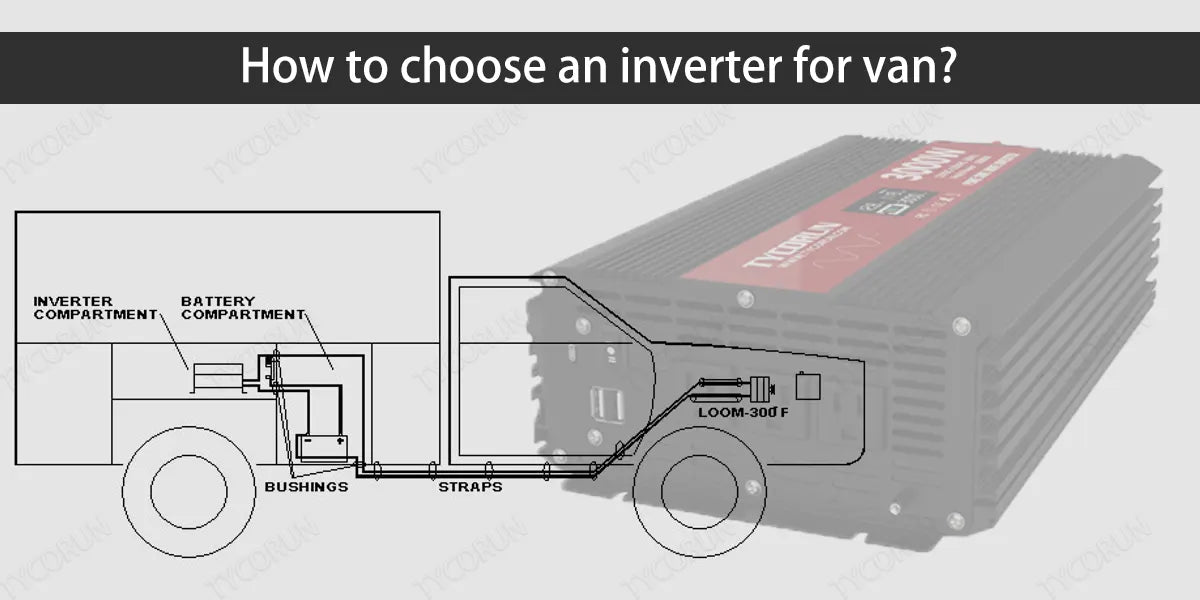
Tips when using a power inverter for van
Investing in a power inverter for van is a way to upgrade the experience, offering the convenience of having electricity on the go. To ensure you get the most out of your inverter and maintain a continuity power supply during your adventures, consider the following tips:
- Monitor battery voltage: Regularly monitor your van's battery voltage, especially when using the inverter. Over-discharging the battery can lead to permanent damage. Many inverters come with built-in voltage meters, but having a dedicated battery monitor is an added advantage. The Tycorun inverter has an LCD display showing precise voltages with up to 98% accuracy.
- Use high-quality cables: The efficiency of your inverter also depends on the quality of the cables used for installation. Invest in high-quality, appropriately sized cables to ensure efficient power transfer and reduce the risk of voltage drop, especially over longer cable runs.
- Secure the inverter: Install the inverter in a secure and well-ventilated location. Consider factors such as easy access, adequate airflow, and proximity to the battery. Secure the inverter using mounting brackets to prevent movement during travel.
- Consider power management: Prioritize your power usage based on necessity. Reserve the inverter for van's power for essential devices, and avoid overloading it with unnecessary appliances. This practice not only conserves energy but also prolongs the life of your inverter and battery.
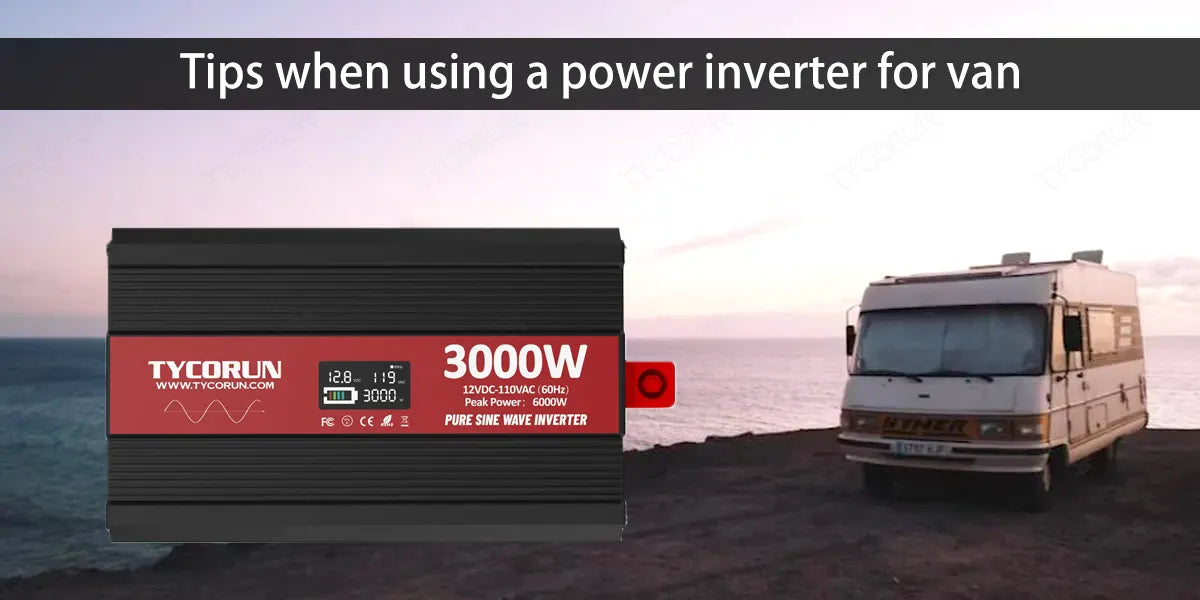
How to install a power inverter for van
Installing a power inverter for van requires careful planning and adherence to safety guidelines:
- Choose a suitable location: Select a secure and well-ventilated location for the inverter, considering factors like easy access, adequate airflow, and proximity to the battery.
- Connect to the battery: Use appropriately sized cables to connect the inverter to the van's battery. Follow the manufacturer's instructions for the correct cable gauge.
- Grounding: Ensure proper grounding by connecting the inverter's grounding terminal to a clean, bare metal surface on the van's chassis.
- Fuse installation: Install an appropriately sized fuse between the battery and the inverter to protect the wiring and prevent electrical fires.
FAQs
Can I use a home inverter for van?
It's not recommended. Home inverters are typically larger, heavier, and designed for stationary use. Van inverters, like the 500w small Inverter, are specifically crafted for the unique demands of mobile applications, offering a more compact and efficient solution.
Does an inverter save electricity?
An inverter itself does not save electricity. Still, it allows you to power essential devices in your van without relying on external power sources, contributing to a more sustainable energy consumption strategy.
How to wire an inverter for van?
- Red terminal to cathode, black terminal to anode.
- Connecting electrical plugs.
- Grounding: Connect the inverter's grounding terminal to the van's chassis.
- Turn on the inverter switch after 20s and finally start the appliance.
Related posts: home inverter near me, top 10 solar inverter best brands in USA, RV inverter